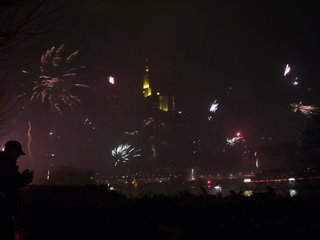 Dispatch From Germany
Dispatch From GermanyLast night's New Year's Eve celebration here in Frankfurt was a grand-scale spectacle unlike anything I've ever seen.
Jana, Cliff and I made our way around 8:00 p.m. to Sachsenhausen, the old part of the city south of downtown, across the Rhine. Walking to our restaurant, I was scared silly step after step by the explosions of firecrackers nearby.
The tradition here is to celebrate entrepreneurially: each brings his or her own fireworks to ignite on New Year's Eve. Forget controlled, orderly, safe, secure scheduled displays that are carefully choreographed to go off a few minutes before midnight. Rather, think merry mayhem.
After a wonderful Thai supper (the new world order means, among other things, that you can now eat anything anywhere) and a couple of lively German pubs, where we joined in songs we did not know in a language we do not speak, we walked to the riverbank a couple of blocks away. Despite a steady rain, tens of thousands were already lining the Rhine by the time we got there. We managed to stake out a good spot overlooking the river and facing the impressive Frankfurt skyline to the northwest, right across from St. Leonard's Church, one of the oldest protestant churches in the city, where the people of God confirmed Goethe's faith in the 18th century, and where one of the only existing stained-glass windows survived the Allied bombing in '43.
No sooner had we got settled into our vantage point than the show began. Slow at first, but then more and more, minute after minute, myriads of bottle rockets and Roman candles began to detonate all around us and up and down the river for over a mile, wave after colorful wave of fiery sprays in the chilly and wet night sky, a constant barrage of fireworks, made doubly stunning not only by their Rhine reflection dancing on the water's surface but also by the iridescent skyline framing them, and persisting with increasing dazzling fervor for well over an hour, until the final climax minutes before midnight generated yet a new level of ferociously streaming color and fire that culminated in a magnificent pyrotechnic
piece de resistance just as the clock struck midnight and St. Leonard's bells pealed for a full half hour.
It was a happy apocalypse, surreal with the smoke and sulfur hanging over the river. Blessedly, we watched from the elevated sidewalk on the bank. The randomness of it all added to the adventure. Scared us at first (well, Jana and me, but not Cliff), but we soon got swept into the delight and magic of it all. The entire thing was splendid, glorious, with the impressive Frankfurt skyline as the backdrop. Shortly after midnight, it began to rain, which only seemed to lubricate the entire affair into a more adamant revelry. As we were climbing in a cab around 1:00 a.m., I turned to see a young
policeman chugging down a beer... which bizarre sight I took as a sign that the party was over for us, and that if we wanted to
live the 2007 whose advent we had just celebrated, we had better get to the safety and sleep of our hotel.
I got to see the July 4 fireworks on the Mall in Washington D.C. in 1977, but last night was even more amazing. People were mostly well-behaved, a miracle in itself. Everyone's personal participation in it heightened the sensation of the event, like some kind of ancient communal festival that bound all these complete strangers together. Lots of dancing, singing, hugging-- my kind of party.

